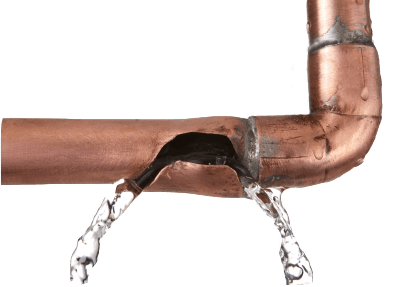- No call-out fees. Plumbers are free to your door.
- Fixed prices, no hourly charges.
- 100% guarantee on all plumbing services.
- Our plumbers arrive on time.
- Industry-leading team of professional plumbers.
BURST OR LEAKING PIPES
WATER LEAKS?
Water leaks at plumbing pipes and fixtures will waste precious water and can damage building structures if left unattended. Regularly checking your plumbing pipes, taps, toilets and plumbing fixtures can save you water and money.
Gillies Group uses the latest technology to quickly and efficiently locate hard to find water leaks. We locate water leaks on cold and hot water pipes, regardless if you can visually see them or not. We are so confident in our abilities to locate your plumbing pipe water leaks that we offer a fixed price to locate them* and if we don’t locate your leak, there is no charge to you*.
That’s satisfaction guaranteed at its best, so give Gillies Group a call today on (08) 9204 4407.
Once we have located the leak we can also fix it while on site. We will also assist you in the completion of the Water Corporation leak allowance form if applicable.
Give our team a call on (08) 9204 4407 to arrange for us to find your water leak.

HOW DO YOU KNOW YOUR PLUMBING PIPES ARE LEAKING?
There are a few Indicators that you have a water leak:
Inside the home
- Sound of running water or dripping water
- Warm spots in walls
- Damp patches on the wall
- Mould on the wall / ceiling
Inside the home
- Sound of running water or dripping water
- Warm spots in walls
- Damp patches on the wall
- Mould on the wall / ceiling
Inside the home
- Sound of running water or dripping water
- Warm spots in walls
- Damp patches on the wall
- Mould on the wall / ceiling
Feel free to give our team a call on (08) 9204 4407 to help find your water leak.
HOW CAN I CONFIRM I HAVE A PLUMBING WATER LEAK?
One of the best ways to confirm you have a plumbing water leak is by conducting your own leak detection test. First, establish that there are no taps, appliances (washing machine, dishwasher, evaporative air conditioner to name a few), or reticulation being used.
Secondly, note the water meter reading of your property (a photo is one of the simplest ways to record it).
Thirdly, note if the dial is visually moving. If not take another reading after 15 minutes.
Finally, if the red numbers have moved, it is possible that you have a water leak and further investigation is required. so feel free to give us call on (08) 9204 4407 to arrange one of our experienced and friendly team members to attend to your water leak.
Remember, water leaks don’t just occur on your plumbing pipes. We also have helpful pages on “Why is my tap leaking?” and “Why is my toilet leaking?”
DIFFERENT PIPES, DIFFERENT SOLUTIONS
The type of material your plumbing system is made from can determine whether a simple repair will suffice or if a complete replacement is needed.
1. Galvanised steel pipes
Most commonly found in older homes built during the 1950s to 80s, galvanised steel pipes were used as a replacement for lead pipes. After decades of use, corrosion and rust can build up on the inside of these pipes, releasing dangerous chemicals into the water. If you suspect your home still has galvanised plumbing, contact Gillies Group immediately.
Signs to replace
Galvanised steel piping tends to get clogged easily, causing blockages, water leaks and reduced water pressure. Keep an eye out for brown discolouration in your water, this usually means there is rust.
2. Copper pipe systems
Copper plumbing replaced galvanised steel and can be found in most Australian homes from as early as the 60’s but it wasn’t until the 80’s where it became the go-to material. Copper is highly resistant, extremely durable if looked after and can be used to transport both hot and cold water. The only issue is that it does not bode well in colder temperatures with the risk of pipes freezing and bursting.
Signs to replace
May find green or blue tinges in the water coming through the outlet, this is usually an issue with brass fittings or ground water supply. If you notice a discolouration in your water, contact Gillies Group immediately and alert your local water authority.
3. PEX Piping
Commonly found in construction of newer, modern homes in Australia. It is extremely resistant to most common piping issues, including leaks, corrosion and rust. PEX piping is highly durable and flexible, easy to install and has the ability to expand, preventing it from bursting. PEX piping is a highly sought-after material that can carry both hot and cold water and is suitable for all climates.
4. PVC Piping
A form of plastic piping widely used in Australian homes to bring cold water into the home and used in sprinkler systems. PVC is an affordable material when compared to other piping materials such as copper. It’s flexible, lightweight and requires very little maintenance as it does not rust or corrode over time. However, as it is made out of plastic, it does not handle extreme heat well nor can it transport hot water.
Signs to replace
Excessive exposure to the sun’s harmful UV rays can cause the piping structure to break down and become brittle. Water travelling too fast through the pipes can cause water hammering and surge pressure can develop.
Gillies Group is a team that works for you, to solve your plumbing problems. Call us now (08) 9204 4407.
